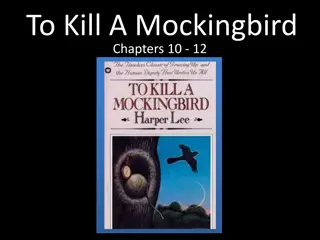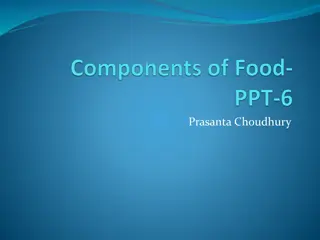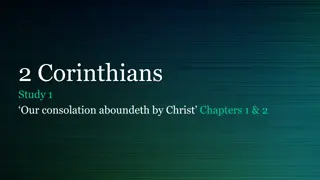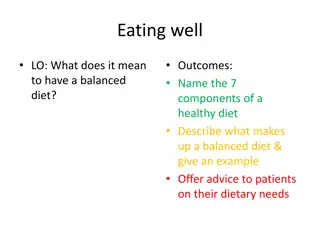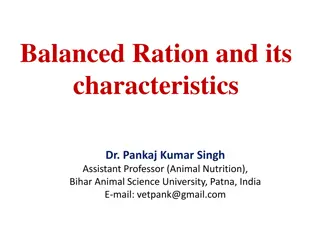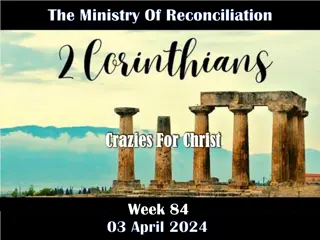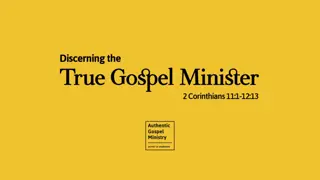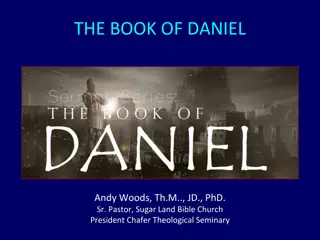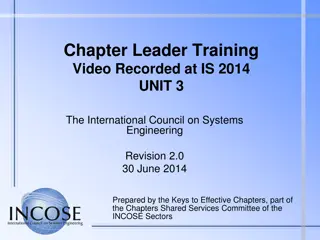Balanced Living in 1 Corinthians Chapters 8-10
Exploring the themes of balancing knowledge with love, authority with discipline, experience with caution, and freedom with responsibility in 1 Corinthians chapters 8-10. Paul's teachings emphasize the importance of considering others, avoiding abuse of liberties, and maintaining spiritual integrity.
Download Presentation

Please find below an Image/Link to download the presentation.
The content on the website is provided AS IS for your information and personal use only. It may not be sold, licensed, or shared on other websites without obtaining consent from the author. Download presentation by click this link. If you encounter any issues during the download, it is possible that the publisher has removed the file from their server.
E N D
Presentation Transcript
1 Corinthians Chapters 8-10
Knowledge must be balanced by love ch.8 ch.9 Authority must be balanced by discipline ch.10 Experience must be balanced by caution Freedom must be balanced by responsibility ch.10:23-33
Ch. 8-10 (Hamilton Smith) Chapters 8,9,10 Paul firmly maintains the liberty of the individual while solemnly warning against its abuse. Ch.8 We are warned against using liberty in a way that may stumble a brother Ch.9 The servant is warned that it is possible to use liberty to his own condemnation Ch.10 We are warned against using liberty in a way that may compromise our fellowship, and give offense to Jews or Gentiles or to the assembly of God.
Ch. 8-10 (WTBT) Ch.8 The brother with knowledge must learn to surrender his right to eat because of the danger of violating the conscience of his weaker brother, and sinning against Christ. Ch.9 Paul demonstrates that he had surrendered his God-given right to support, that the gospel may not be hindered v.12 and that it may be preached free of charge v.18. Ch.10 Paul draws attention first to the experience of the children of Israel, and warns that to indulge in idolatrous feasts could bring them under divine judgment vv.1-13; secondly, to fellowship with idolaters being incompatible with the sacred fellowship which we enjoy vv.14-22; finally, he sets forth certain guidelines as to shopping and having a meal with an unbeliever vv.23-33.
Chapter 8 1. Difference of Opinion 2. Tender Conscience 3. One for Whom Christ Died
In 8:7-13 the apostle tells us there were Christians in Corinth who still had regard for the idol, and who felt defiled by eating meat offered to an idol. Note the reference to a: weak conscience v.7 a defiled conscience v. 7 an emboldened conscience v.10 a wounded conscience v.12
8:7 incapable of forming sound, healthy judgment. Eating is not wrong, but their conscience judged it to be wrong. Defiled means doing wrong. Weak means not clear as to whether an action is right or wrong, and so 8:9 consider its effect upon others not so intelligent or spiritual. No matter how right our conduct may be, we must be prepared to 8:12 J.M.Davies Wounding weak conscience is like striking an invalid. John Heading From our point of view in this day of grace, we should note very carefully that the act of stumbling a brother, is something that will be considered before the judgment seat of Christ. Romans 14:10-13.
Observations and Raw Principles v.8 Food doesn t matter doesn t make holy or unholy {quite a statement or a Jew!} v.9 Don t let your liberty become a stumbling block v.11 The brother for whom Christ died!!! v.13 Ties in to verse 1- love edifies. If food (or anything) cause my brother to stumble : I will never ( Fill in the blank)___________
Rom 14:10-15 (10)But why dost thou judge thy brother? or why dost thou set at nought thy brother? for we shall all stand before the judgment seat of Christ. (11) For it is written, As I live, saith the Lord, every knee shall bow to me, and every tongue shall confess to God. (12) So then every one of us shall give account of himself to God. (13) Let us not therefore judge one another any more: but judge this rather, that no man put a stumblingblock or an occasion to fall in his brother's way. (14) I know, and am persuaded by the Lord Jesus, that there is nothing unclean of itself: but to him that esteemeth any thing to be unclean, to him it is unclean. (15) But if thy brother be grieved with thy meat, now walkest thou not charitably. Destroy not him with thy meat, for whom Christ died.
8:13 Paul now states his conclusion and the principle that would guide him. If eating meat stumbles his brother (an expression used four times in the last three verses) then he would gladly surrender such privilege and right. It must be carefully noted this verse does not teach that the spiritual man must always accommodate himself to the less spiritual. It is in such a matter as indicated, i.e. eating meat; otherwise legalists would impose their tenets upon all, and bring such into bondage. The exercise of consideration is the voluntary response on the part of the spiritual brother to love s compulsion, when another s conscience may be offended, not to the demands of the unspiritual!
Consideration for the weaker conscience of your brother is the important matter, and limiting one s own liberty is vital for his well- being. What my conscience may allow me to do, love for my brother may prohibit. Love may limit what conscience permits. Galatians 5:13 For, brethren, ye have been called unto liberty; only use not liberty for an occasion to the flesh, but by love serve one another.
Chapter 9 vv.1-11 Rights v.12 Rights forgone v.15 Rights forgone v.18 Gospel without charge vv.19-23 For sake of the gospel vv.24-27 Self-denial; Self-control or disqualification
1 CORINTHIANS 9 Paul vindicates his office as an apostle, vv.1-3. Paul establishes his right to be supported but denies that he has exercised that right, vv.4-15. Paul explains the ground of his glorying, vv.16-18. Paul chooses to use his freedom from all to voluntarily enslave himself to all that he might save some, vv.19-23. Paul draws an illustration from the Greek games to sound a warning against complacence and self-confidence, vv.24-27.
His right to maintenance justified on seven grounds : 1. The precedent set by the other apostles, vv.4-6; 2. Examples drawn from ordinary, everyday life, v.7; 3. The teaching of the scriptures, vv.8-10; 4. Fairness the repayment of a debt, v.11; 5. The practice of other preachers and teachers, v.12; 6. The divinely chosen method of supporting religious workers in Israel, v.13; 7. The Lord s express appointment, v.14.
9:15 1. Firstly, he feels compelled to explain why he does not take gifts. 2. Secondly, he desired to impress upon them that in the business of preaching he was constrained, not just by desire to preach, but by the consciousness that a sacred trust had been committed to him by God. 3. Thirdly, he had determined that the gospel would be preached free of charge.
Chapter 10 vv.1-4 Common spiritual experience 10:1-2 Corinthians. To frequent idol temples and socialize with idolaters must inevitably end in disaster. All the circumstances at the time of the Exodus were analogous to baptism. The solemnity of all this teaching must not be ignored by the 10:4 The parallelism implied here between Israel s baptism and the provision of God for them, and a table in the wilderness Psalm 78:19, and baptism at the beginning of our Christian witness, and the Lord s table of v. 21 is too obvious to be overlooked.
Chapter 10 v.5 Ties in with 9:27 v.6 Examples for us not to: v.6; v.7; v.8; v.9; v.10
10:5 In the previous section they all participate in five blessings; in this section he names five sins under whose power they fell: 1. Lust v.6 2. Idolatry v.7 3. Fornication v.8 4. Presumption v.9 5. Murmuring v.10 Paul is not looking upon these incidents as merely historical, but states in v.6, and later in v.11, that they were examples for us, lest we fall into the same sins. They were a solemn warning to us.
10:6 They were craving for the things they enjoyed before they were redeemed.
I have to say that, having been a Christian for a little over 40 years, I find it salutary in the extreme that the incident mentioned in v.8 is found in Numbers 25 - at the end of Israel s 40 years of wanderings when the people who fell had already surmounted many obstacles, had already overcome many temptations, and had so far come through unscathed. They were on what would have been their last lap but they never finished it! The Lord wants us to know and never forget that we are most vulnerable when we least realise it. (Malcolm Horlock)
Chapter 10 v.11 Reiteration of v.6 v.12 Principle Don t be over confident in self. Stay dependent! To be self-satisfied, self-complacent is very dangerous.
vv.13-14 Paul now counsels his readers to flee from idolatry. But, if in vv. 1-12 we are admonished by Israel s failures, in v.13 we are encouraged by God s faithfulness. (Malcolm Horlock)
10:14-22 God upon those who succumbed, Paul now makes his appeal to the Corinthians to shun it completely. Firstly, he indicates in vv.14-17 that we as believers express our fellowship and identification with Christ on the basis of His work of redemption. Secondly, in v.18 he illustrates from the experience of Israel the truth that he who shares in the eating of the sacrifice is identified with the altar, and with the God of the altar. Thirdly, in vv.19-22 he shows the complete incompatibility of Christianity and idolatry. Thus, he shows that in partaking of the Christian supper, or of the Jewish altar, or of the idolatrous Gentile table, each is expressing fellowship with the God to whom the worship is offered. Having set forth in the previous verses the terrible judgment of
vv.15-17 Participation; sharing; fellowship; partaking 10:15 Judge ye calls for a definite decision. 10:17 The line of argument is clear. One fellowship must exclude all others.
If in chapter 8, Paul taught them that a believers attitude to idol meat should be determined by his concern for his brother because his brother is weak in this chapter, he teaches them that a believer s attitude to idolatry itself should be determined by his concern for himself because he is considerably weaker than he thinks and idolatry is far more dangerous than he has ever imagined. It s necessary, he is saying, for you, Mr Corinthian, to avoid idolatry not only for the sake of others but for your own sake too. For it s not only that the weak brother may be caused to stumble , but the supposedly strong brother is in real danger of falling as well.
v.18 Old Testament illustration v.19 New Testament application v.23 Principle Just because I can do it doesn t mean it is helpful or beneficial. Lawful must have reference to matters of moral indifference. Not expedient means not helpful, beneficial, profitable, that is, to ourselves or others.
v.24 Principle -Ties in with 10:23b It s not all about me or what I can do I am to seek other s wealth and well- being over my own. Just because I can doesn t mean I should
vv.25,26 Liberty v.27 Liberty vv.28,29 Love vv.29b,30 Liberty Why should we selfishly exhibit our liberty to eat meat when we know that this will lead our brother to misunderstand entirely what we are doing and therefore to condemn us for condoning idolatry. Frankly, it would be outrageous for us to needlessly upset and provoke our brother .(Malcolm Horlock)
v.31 Principle Can I do ( fill in the blank ) to the glory of God? Will he be honored or dishonored by my action or activity? v.32 Principle - Can I do ( fill in the blank ) without causing offense?
v.33 1.Even as I please all men in all things, Three Principles here 2.not seeking mine own profit, but the profit of many, 3.that they may be saved.
Summary In the section before us 10:23-11:1 he applies the principles, not to idolatry as seen in the idol feast, but to the eating of meats offered in sacrifice to the idol. It is necessary to notice the distinction that Paul is making between attendance at idol feasts, which is forbidden to a Christian, because it would involve him in idolatry, and the eating of meat offered to an idol, which is not in itself idolatrous, and was not harmful. In vv.23-24 we have the principle restated; in vv.25-30, the application of the principle; and in vv.31-11:1, the conclusion, or deduction.




